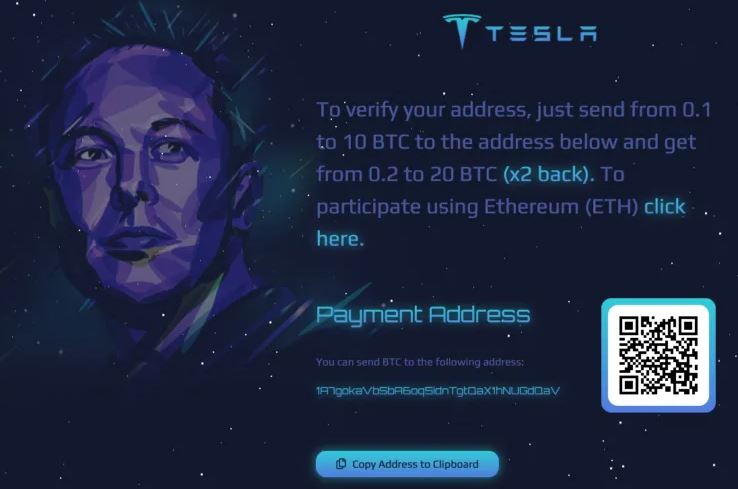Cybersecurity specialists have reported the detection of an online campaign that uses the image of Elon Musk and his auto company Tesla for malicious purposes. The operators of this fraud invite users to send 5 Bitcoin (BTC) or 100 Ethereum (ETH) to a specific cryptocurrency address; if users make the transfer, they would allegedly be rewarded with a Tesla Model S.
The scam was detected on the spacexbaby(.)com website and, to begin with, the criminals ask potential victims to send a transfer of between 0.1 and 10 BTC in order to verify their cryptocurrency wallets, assuring them that upon completion of verification they will receive twice the amount sent.

However, before they began to infest the Internet with fake publications, the criminals took advantage of a tweet from the famous writer J.K. Rowling to announce the alleged promotion: “We are giving away Bitcoin. Do you want some?” mentions the hacker’s post by usurping Elon Musk’s name.

Specialists believe that scammers are looking for users unfamiliar with such scams. While the cryptocurrency community is accustomed to this kind of malicious publications, some virtual asset enthusiasts still don’t know all the risks involved in getting involved in this world.
In this case, it is easy for many users to fall into the trap because the account that responded to Rowling’s tweet has the Twitter verification stamp. However, looking closely at the username you can see that the account does not belong to Elon Musk, but is the user’s @jenrrain. Most likely the criminal group hacked this account and used Musk’s name and avatar to trick users. The compromised account belongs to writer/editor Jennifer Marquez. It seems that, so far, the account is still controlled by the hackers.
By entering both Twitter profiles, you can perfectly see the difference between Musk’s account and the writer’s account, since the criminals didn’t even take the trouble to change the description on the hacked profile.


Apparently the scam is still active, so cryptocurrency enthusiasts should be careful, especially those with less experience. To know the scope of this scam, cybersecurity firms regularly monitor the virtual wallet addresses associated with criminals, where you can see if hackers have received any transfers.
For security, users of any online platform should ignore these posts, as well as always remember that any offer too good to be true should certainly be a scam.
He is a cyber security and malware researcher. He studied Computer Science and started working as a cyber security analyst in 2006. He is actively working as an cyber security investigator. He also worked for different security companies. His everyday job includes researching about new cyber security incidents. Also he has deep level of knowledge in enterprise security implementation.
